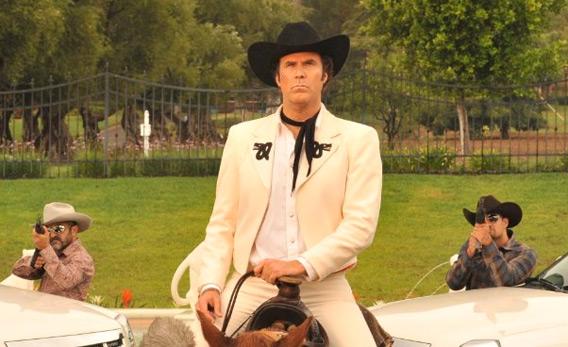Casa de Mi Padre
A remake of a bad movie that never really existed.

© 2012 - Pantelion Films
Click on the audio player below to listen to Slate's Spoiler Special podcast on Casa de mi Padre after you've seen the movie.
I’ll say this for Casa de Mi Padre (Pantelion Films), the Spanish-language mock-melodrama starring Will Ferrell as a dense Mexican rancher: It’s deeply committed to its own weird conceit, diminishing returns and all. This 84-minute extended skit is an argument for the return of the two-reel comedies that used to precede feature-length films in the early days of cinema: It has just enough good jokes that it would have been hilarious at one-quarter of its length. But as squirmy as I got in my seat toward the end, I had to admire how stubbornly this odd film—a deadpan pastiche of spaghetti Westerns, grindhouse exploitation flicks, Mexican telenovelas, and Scarface-style gangster shoot-‘em-ups all at once—sticks to its guns.
One of the best things Casa de Mi Padre has going for it is that everyone involved seems to have been on the same page: not just Ferrell and his Mexican co-stars Gael García Bernal and Diego Luna, but writer Andrew Steele and director Matt Piedmont (both SNL veterans who have also worked with Ferrell on his comedy website Funny or Die), as well as the production and costume designers who fashioned this movie’s visually pleasing world. Casa de Mi Padre looks amazing, from the splashy Saul Bass-esque opening credits to the deliriously fake sets (painted outdoor backdrops with a single silhouetted cactus!) to the ravishingly tacky costumes. But the movie remains all dressed up with no place to go. We never get enough of the one element that would bring it all together, namely, funny jokes following one another in reasonably rapid succession.
Casa de Mi Padre is a remake of a bad movie that never really existed, the ur-bad movie everyone half-remembers seeing on TV one Sunday afternoon when they were 10. Armando Alvarez (Ferrell, speaking decently fluent gringo Spanish) is the dumb but bighearted son of a small-time rancher (the late Mexican actor Pedro Armendáriz Jr. in his last role). His younger brother Raul (Luna), a drug dealer and their father’s undisguised favorite, has just returned from Mexico City with a flashy entourage and a smoking hot fiancee (the Venezuelan-American Genesis Rodriguez, known as a soap star in Mexico). Upon first laying eyes on each other, Armando and Sonia recognize they’re soul mates—but how can one Alvarez brother betray another? And how will Armando protect his family when a ruthless rival drug lord, La Onza (García Bernal), decides to horn in on Raul’s turf?
Some of the gags in Casa de Mi Padre spring from the deliberate turgidity of the dramatic conflicts described above. But the vast majority of the jokes have to do with form rather than content. Continuity errors, lens flares, blatantly obvious stunt doubles, schlocky zoom shots: These cinematic solecisms are the most common objects of this movie’s loving ridicule, so if you’re indifferent to the details of film grammar, you may find those 84 minutes very long indeed.
Even as a fan of film-nerd humor (and a viewer who’s willing to put up with a lot from Will Ferrell), I lost patience with Casa de Mi Padre’s monomaniacal obsession with jokes about choppy edits and cheap special effects, as cleverly realized as those jokes often were. But then an inspired moment would lure me in again, like the dopey ranchera song that Armando sings with his ranch hands around the fire, pausing to clean the spit valve of his trumpet before embarking on a solo. There’s also a sex scene that riffs hilariously on one silly, mildly risqué image. As Armando and Sonia consummate their love to the sound of soaring music, we get shots of him kneading her buttocks in every conceivable way: lascivious squeezing followed by side-of-the-hand-chopping followed by methodical circular pats. It’s the number of times the shot recurs, the pushing-the-joke-too-far, that makes it funny.
I regard Casa de Mi Padre as an interesting but failed experiment, and many viewers may regard it with open irritation and bafflement (though I have a feeling Latino audiences will warm to the movie’s evident love of vintage Mexican pop culture). But at least this movie stands as welcome evidence that, at this transitional moment in his career (last year he starred in his straightest dramatic role so far, as a depressed alcoholic in Everything Must Go), Ferrell is interested in experimenting and having fun. (If you need further evidence to bolster the Ferrell-goes-avant-garde theory, witness his high-concept Super Bowl spot for Old Milwaukee beer, which aired only in Nebraska.) Not only is Ferrell not pandering to that segment of his audience that expects a Talladega Nights retread every year; he appears to be deliberately messing with their heads.
Described in the abstract, Casa de Mi Padre sounds almost like a conceptual art film, something you might catch at MoMA. On the screen, unfortunately, the only thing radical about it is how consistently not-quite-funny it is. A movie this full of slapstick gags, slow-motion shootouts, and bad animatronic animals should move faster; the audience should feel like jokes are flying at us quicker than we can keep up with them. This movie is content to trudge, burrolike, from one laugh to the next, and sometimes that’s quite a distance to cover.
